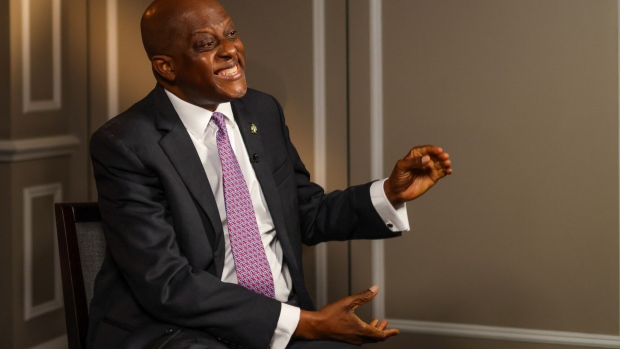Nigeria Central Bank Head Cardoso says worst of Naira volatility is over
Nigeria’s central bank Governor Olayemi Cardoso said the bank is “relatively pleased” with the progress it has made in stabilizing the naira and believes the excessive volatility may be a thing of the past.
“I do believe that we have more or less seen the worst in terms of volatility,” Cardoso said in an interview with Bloomberg TV on Tuesday. “We are also very alive to observing the way and manner in which that market operates and ensuring that it gives the best value that that can be accomplished using certain tools,” he said.
Since taking the helm of the central bank of Africa’s most populous nation in September, Cardoso has undertaken a series of steps to restore orthodox monetary policy aimed at confronting rampant inflation, attracting foreign inflows and stabilizing Nigeria’s currency.
Interest rates have been increased by 750 basis points this year to 26.25%, a foreign-exchange backlog has been cleared, and the country’s exchange-rate policies have been overhauled — effectively devaluing the naira.
Those policies have seen the naira trading in a narrow range between 1,473 and 1,490 per dollar this month, according to data compiled by Bloomberg. That has sent its 10-day rolling volatility to the lowest in at least a year and its 100-day swings to the least since January.
“We’re relatively pleased with where we are,” Cardoso said. Even so, he said the central bank needs to do more. “It’s continuous work in progress. And we will do everything possible to ensure that we continue to manage the macroeconomic fundamentals that affect that.”
The steps have also seen the annual inflation rate that’s remained stubbornly high — because of the currency devaluation, food insecurity and the removal of energy subsidies — rising at a slower pace. Consumer prices rose 34% last month, compared with 33.7% in April, suggesting that it’s approaching a peak.
The governor refused to be drawn on whether this could signal the end to the tightening cycle that began in May 2022, when the central bank’s monetary policy committee meets in mid-July.
“Data will direct whether they see further hikes or not,” he said. “The MPC has been very clear in stating that they see inflation as a major impediment for the future of Nigeria, and they will do everything possible to ensure that they keep inflation in check and in fact bring it down as reasonable as they can and I don’t see that changing.”
The central bank’s steps and fiscal reforms have also helped the nation secure much needed liquidly. The World Bank earlier this month approved $2.25 billion in funding to support Nigeria’s economic reforms helping boost its foreign exchange reserves.
The governor said the central bank would support further measures to build the country’s reserves including a eurobond issue.
“We should have a diversity of sources,” Cardoso said. “It shouldn’t just be the eurobond market, it shouldn’t just be foreign portfolio investors, it should be a hodgepodge of different things.”








